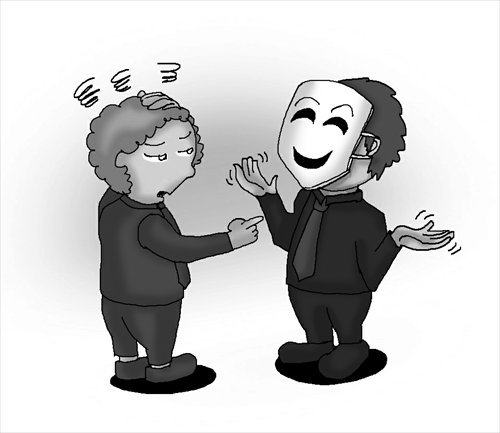Why the Chinese seldom admit their mistakes

Illustration: Lu Ting/GT
There is one thing you will seldom hear in China: "It's my fault."
In the West, saying "My bad" is heard as frequently as anyone makes a mistake. We pride ourselves on admitting our faults so as to quickly remedy the situation. But here in China, it seems that admitting a mistake is a major concession that most people are utterly unwilling to do.
You will witness this at every level of Chinese society, from the car that honks at YOU while you cross the street even though it's your green, to the vegetable lady at the market who gets angry at YOU when you catch her selling rotten produce, to the taxi driver who blames YOU for getting him lost just because he was unfamiliar with your destination.
It should be first understood that, in the eyes of the Chinese, taking responsibility and coming clean on a dispute puts that person in a position of "losing face," which is the worst thing that can happen to a Chinese. Think of it as the Western equivalent of getting bitch-slapped by someone in public.
Now, when foreigners in China are placed in a situation where your Chinese interlocutor is doing everything to avoid losing face - and trust me, they will try anything - you either just accept their insincere excuse knowing that you spared them from embarrassment, or you drag that person deeper into their contradiction until they are dying of shame.
But before you proceed down one of those two paths, be aware that there are essentially two kinds of losing face. The first is "one-on-one losing face," where they'll never be able to look you in the eyes again without turning red, but at least nobody else knows. The second, and most dreaded, is "losing face in public," which is so unbearable to most Chinese that they would rather be exiled from society than face onlookers.
"Losing face in public" can further be divided into two circumstances: social and professional. An example of social would be like accusing your wife in front of neighbors of having a secret lover. She would sooner move apartments or cities after that than return to her own community to face whispers and gossip.
For professional losing face, I actually have quite a bit of experience with this. In my line of work here in Shanghai, I have to manage numerous industrial productions, which requires me to constantly deal with Chinese factory employees of all levels, from assembly line girls to factory bosses to CEOs.
Production problems are quite frequent, which is normal, but as opposed to disclosing the issue and attempting to resolve it expediently, which is how Western bosses would, here in China local bosses prefer to try to conceal the problem in the hopes that nobody finds out. The thing is, I always find out! But it wastes an enormous amount of my time to have to dig through all the layers of lies and deceit purposely thrown in my path by these bosses. All because he didn't want to lose damn face.
And this is where it gets even more absurd, because even if you call a Chinese out on their mistake, the only thing you'll hear back from them is "It's not my fault!" (bu guan wo shi) or "It couldn't be helped" (mei banfa) or "It was because of this-and-that!" The very last thing they'll ever be willing to tell you is "Yes sir, it was my mistake. I'm very sorry, how can I fix it?"
All told, I wonder how many years, decades or even centuries "face" has cost China in terms of lost production hours. How much more time have Chinese bosses spent covering up their mistakes instead of simply disclosing and resolving them? China might very well already be the world's superpower by now if it hadn't wasted so much time spinning lies and childish excuses every time someone mistepped.
I'm writing this not to criticize but to compel the next generation of Chinese to abandon the ridiculously prehistoric custom of "face" and start facing up to your mistakes and taking responsibility for your actions. You'll be surprised how much more people will respect you, and how much more efficiently your society will operate.
The opinions expressed in this article are the author's own and do not necessarily reflect the views of the Global Times.